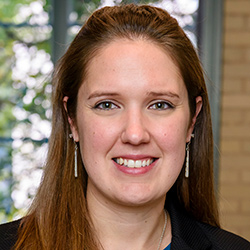2025 Mellichamp Lecture: Dr. Linsey C. Seitz
2025 Mellichamp Lecture: Dr. Linsey C. Seitz
| Event Date: | October 7, 2025 |
|---|---|
| Speaker: | Dr. Linsey C. Seitz |
| Speaker Affiliation: | Northwestern University |
| Time: | 3:00-4:15 p.m. |
| Location: | FRNY G140 |
| Contact Name: | Joshua Gonzalez |
| Contact Phone: | 765-494-4365 |
| Contact Email: | [email protected] |
| Open To: | Attendance required for ChE PhD students |
| Priority: | Yes |
| School or Program: | Chemical Engineering |
| College Calendar: | Show |
Bio:
Dr. Linsey Seitz is an Associate Professor in the Chemical and Biological Engineering Department at Northwestern University. She received her B.S. (2010) in Chemical Engineering from Michigan State University, supported with a full ride scholarship. She earned her M.S. (2013) and Ph.D. (2015) in Chemical Engineering from Stanford University supported as an NSF Graduate Research Fellow and later as a Stanford DARE Fellow. Dr. Seitz completed postdoctoral research at the Karlsruhe Institute for Technology with the Institute of Photon Science and Synchrotron Radiation, supported by a Helmholtz Postdoctoral Fellowship. Her research uses tools at the interface of electrocatalysis and spectroscopy to investigate dynamic catalyst materials and reaction environments towards the sustainable production of fuels and chemicals, as well as upconversion of waste streams. Dr. Seitz was recently honored with the ACS Catalysis Early Career Award (2024) and has been recognized as a “Pioneer of the Catalysis and Reaction Engineering Division” of AIChE (2021). She has also received an NSF Career Award (2022), an Alfred P. Sloan Research Fellowship (2025), and a Camille Dreyfus Teacher-Scholar Award (2025).
"Characterizing Dynamic Materials and Systems for Sustainable Electrocatalytic Technologies"
Abstract:
Electrochemical processes provide a unique set of parameters to optimize catalyst material and reactor performance, while enabling operation at atmospheric temperature and pressure, producing few pollutants, and providing a mechanism for storage and conversion of vital renewable electricity sources. However, these unique reaction environments also commonly induce complex rearrangement of the catalyst electronic and geometric structures, such that the operational catalyst active sites do not resemble the pristine synthesized materials. The Seitz Lab uses controlled material syntheses and advanced spectroscopy techniques to monitor dynamic behavior of catalysts in response to electrocatalytic reaction conditions. Notably, we have developed several iridium-based perovskite and precious metal-free catalyst materials to establish electronic structure effects associated with systematic changes in composition, crystallinity, and strain. We also employ a range of reactor geometries spanning fundamental rotating ring disk electrode setups to applied membrane electrode assemblies to probe and understand the relationships between bulk reactor parameters, local catalyst reaction environments, and catalyst performance outcomes. We use these materials, reactor systems, and operando spectroscopy techniques to elucidate trends in catalyst structural reorganization and activation / degradation mechanisms induced by relevant reaction conditions. With these tools, we investigate a range of oxidative and reductive processes for water / hydrogen / oxygen / peroxide systems, as well as more complex organic species. Benchmarking performance and intrinsic material stabilities for catalysts based on platinum and non-platinum group metals provides a critical outlook for the future of emergent technologies based on these processes. With this work, the Seitz lab aims to exploit electrochemical processes and reaction environments to understand and harness catalyst material dynamics to achieve enhanced activity, selectivity, and stability for sustainable production of fuels and chemicals.

